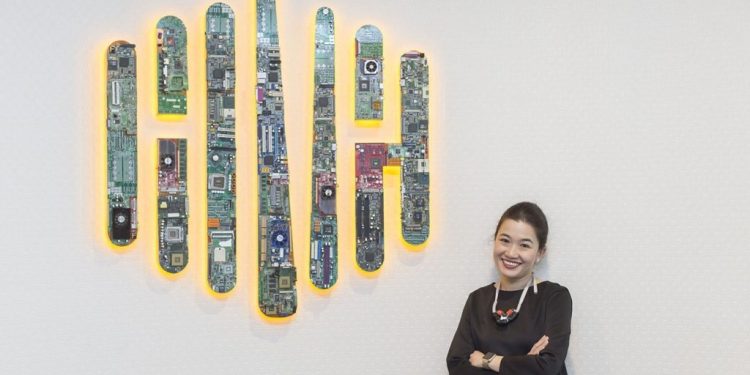She ranks Star Wars high up on the sci-fi chart, envisions the world in 2050 to be that in Minority Report and is currently obsessing over brain-machine interfaces in her free time.
Little wonder then that Jacqueline Poh, 42, is the chief executive at Government Technology Agency (GovTech).
Her 16 years of experience in public service includes her role as the managing director of GovTech’s predecessor, the Infocomm Development Authority. That was in 2013, the early days of Singapore’s Smart Nation movement.
The Women’s Champion
With a background in politics, philosophy and economics, tech is not really her area of expertise. However, that does not mean her passion and contributions are any less – a point she wants to make to women who are hesitant to join the Science, Technology, Engineering and Mathematics (STEM) industries.
“I think the general resistance could stem from pre-conceived notions that a career in tech only revolves around programming or engineering. However, there are also other roles that are highly suitable for women working in tech companies. These include entrepreneurship, business strategy, user experience design, product management and operations.
“In my recent trips to Silicon Valley, I have met a lot of Singaporean women who have been very successful in programme manager or product manager roles there,” said Jacqueline.
While there have been a growing number of female leaders in tech companies, the 30 per cent female representation in the industry remains low. Jacqueline suggested that the subliminal messages by educators may have played a part.
She once watched a YouTube video by Microsoft in 2016 that asked young girls to name famous inventors. They did so very easily, naming the likes of Thomas Edison and Nikola Tesla.
“Then, they were asked to name a female inventor and were stumped. Every person they were taught about at school who invented something significant was a man. Women have made numerous advancements in Information and Communications Technology (ICT) and computer science, yet they have gone unnoticed.”
As examples, Jacqueline brought up Ada Lovelace who created the first-ever computer algorithm, “the Queen of Software” Grace Hopper who helped pioneer computer programming, and Carol Shaw who pioneered Atari game design.
They are not always “geeks” either.
“Sister Mary Kenneth Keller was the first computer science PhD graduate and also a nun. Hedy Lamarr was a glamorous Hollywood actress, and after World War II, she was awarded a patent on pioneering frequency-hopping spread spectrum wireless technology.”
The Tech Crusader
Jacqueline played a key role in the founding of GovTech, which leads Singapore’s Smart Nation efforts and drives the public sector’s digital transformation.
On a typical work day, you will see her in meetings with her teams to discuss the progress of various projects and working with other public agencies to see how GovTech can partner them in their digitalisation journeys and use tech to solve pressing challenges.
“Technology appeals to me because of the fast-paced, ever-changing, optimistic nature of the industry. It is possibly the most dynamic sector, and the progress in tech also underpins all other sectors.”
Improving Singaporeans’ lives is one of Jacqueline’s greatest motivation to up the quality of public service delivery and adoption of technology.
One such example is the Parking.sg mobile app jointly developed by GovTech, Housing Development Board and Urban Redevelopment Authority. The app has enabled motorists to extend their parking sessions, and more importantly, refund unused parking time without the need to scramble around to look for paper coupons.
ICT professionals with a range of deep technical skills will be in great demand in the digital economy. That means that opportunities will be abound for women to take up STEM jobs or work in related industries.
The Pro-Family Supporter
According to Jacqueline, over 40 per cent of GovTech’s workforce are female, higher than the tech industry average of 30 per cent.
As a mother of three, Jacqueline understands the challenges of juggling family and career commitments very well, and has put in place several progressive initiatives to support others like her.
Other than the standard maternity and paternity leave, GovTech provides up to 15 days of childcare leave for parents with three or more children. The company also celebrates an Eat-with-Your-Family day every quarter where staff get an early dismissal, and offers flexible working hours, telecommuting and part-time work arrangements.
“Since 2016, we have also introduced a half-day Back-to-School time-off for parents with any school-going child or children aged seven years old and below on the first day of school in the new year. This is to encourage parent-child bonding and help to ease any anxieties experienced by young children when schools re-open.”
(Photo Credit: Singapore Computer Society)

